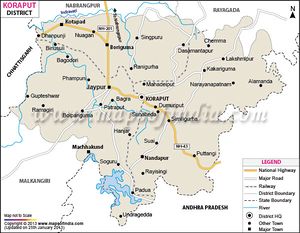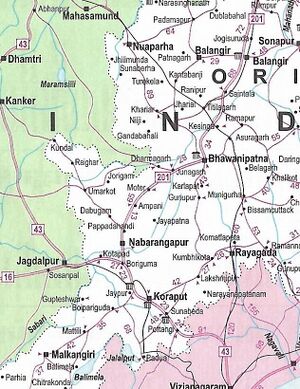Jeypore
| Author:Laxman Burdak, IFS (R) |

Jeypore (जयपुर) is one of the largest towns and a place of historical significance in Koraput district in the Indian state of Odisha.
Location
Geographically, Jeypore is a hilly region surrounded by Eastern Ghats and the Araku hills on three sides like a horseshoe with the western side opening up to Chhattisgarh in central India.
Sabari River, next to Indravati River in importance divides Bastar from Jeypore on the east. [1]
Founders
It was established by Vir Vikram Dev in the mid 17th century. The kingdom was defeated by the East India Company in 1777 who declared it a Zamindari or Feudatory of the British Crown and much later got acknowledged as a Princely state until its dissolution in the Dominion of India in 1947.[2]
The erstwhile kingdom was spread over the region of Uttarandhra and Southern Odisha.
History
Before getting the name ‘Jeypore’ by the Suryavanshi kings this land was ruled by various dynasties like the Satavahanas, Ikshavakus, Nalas, Gangas and Shilavanshis. In 1443, Vinayak Dev the prince of Northern Kashmir married the only daughter of the Shilavanshi king and inherited the kingdom of Nandapur. He extended his territory while ruling as a vassal ruler under the Gajapati empire. However, after the decline of the Gajapati dynasty, the then Nandapur ruler Vishwanath Dev claimed sovereignty and began ruling as an independent chief in the South Odisha and North Andhra Pradesh region under the title of “Nauna-Gajapati”.
According to some sources, Vishwanath was able to extend his kingdom from the boundaries of Bengal in North to the coast of Godavari in South. By doing so he rightfully adopted the title of “Gajapati”.
In 1571, after the death of Vishwanath Dev Gajapati, the kingdom under the kinship of his son Balram Dev lost frequent battles to the Qutb Shahi of Golconda and became a tributary kingdom.[citation needed]
In 1649, Maharaja Veer Vikram Dev abandoned the old capital of Nandapur and founded Jeypore, located amidst hilly ranges and dense forests. It is believed that the continuous intrusion of the Qutb Shahi governor and his military which was weakening the administration of Nandapur forced the king to shift his capital to a strategically viable land. The relationship between Qutb Shahi Sultan and the Maharaja improved significantly in the regime of Veer Vikram. Nevertheless, Krishna Dev, the successor of Veer Vikram, stopped paying tributes to the Golconda Durbar and claimed independence. In 1674, the next ruler, Vishwambhar Dev defeated the Qutb Shahi Governor of Chicacole who administered on behalf of the Sultan of Golconda and re established the control of his family over the North Andhra region up to Godavari. This king is known as the father of the feudal system of Jeypore because he established many zamindaris across the North Andhra and South Odisha region.
However, the military coup executed by Balram Dev III against his brother Maharaja Ramchandra Dev in 1710 ensured the collapse of the kingdom. Many feudatories of Andhra claimed independence from Jeypore and the kingdom lost a large extent of territory.
The kingdom faced many challenges but remained sovereign until the advent of the British in 1777. Maharaja Vikram Dev battled the enemies on two fronts but was defeated on both occasions and his kingdom was demoted to a Zamindari for its hostile stance towards the British.
Even as a zamindari, the growth and development of Jeypore continued in the regime of Maharaja Ramchandra Dev III, Maharaja Vikram Dev III, Maharaja Ramchandra Dev IV and the last official ruler, Maharaja Vikram Deo Verma (Vikram Dev IV).[citation needed]
In 2013, Vishweshvar Dev was crowned as the pretender Maharaja of Jeypore becoming the twenty-seventh king on the 570th anniversary of the dynasty.[3]
जयपुर
जयपुर भारत के ओड़िशा राज्य के कोरापुट ज़िले में स्थित एक शहर है। यहाँ से राष्ट्रीय राजमार्ग 26 गुज़रता है।
References
- ↑ Bastar The Imperial Gazetteer of India, 1908. v. 7, p. 121
- ↑ https://koraput.nic.in/history/
- ↑ Pattnaik, Satyanarayan. "Jeypore hails its new lord". Times of India. Times of India.
Back to Orissa
